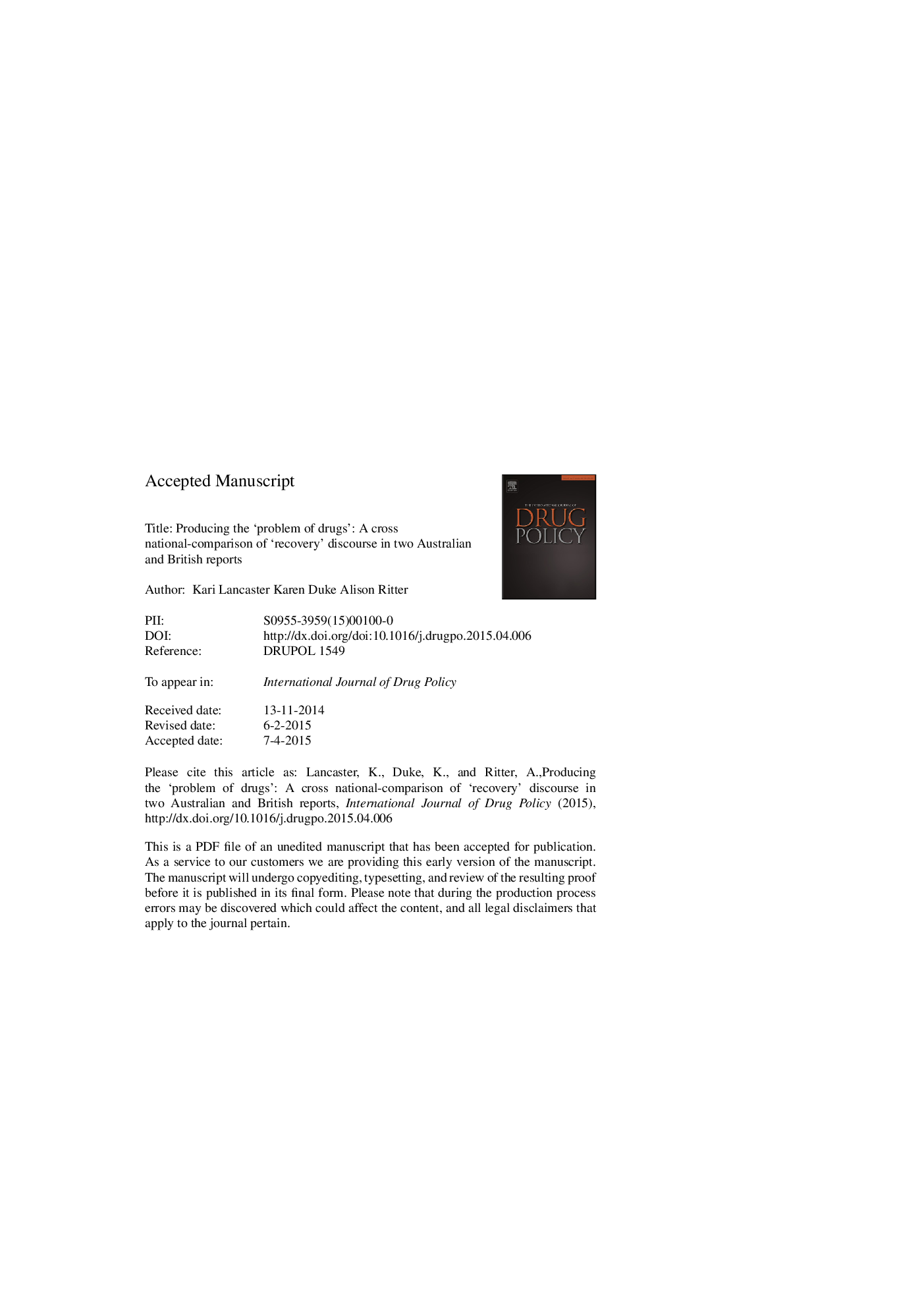| کد مقاله | کد نشریه | سال انتشار | مقاله انگلیسی | نسخه تمام متن |
|---|---|---|---|---|
| 7513276 | 1486284 | 2015 | 32 صفحه PDF | دانلود رایگان |
عنوان انگلیسی مقاله ISI
Producing the 'problem of drugs': A cross national-comparison of 'recovery' discourse in two Australian and British reports
ترجمه فارسی عنوان
تولید "مشکل مواد مخدر": مقیاس ملی مقایسه گفتمان "بهبود" در دو گزارش استرالیا و بریتانیا
دانلود مقاله + سفارش ترجمه
دانلود مقاله ISI انگلیسی
رایگان برای ایرانیان
کلمات کلیدی
بهبود، سیاست مواد مخدر، استرالیا، بریتانیا، مشکالت کارول بکچی،
ترجمه چکیده
مفهوم "بازیابی" به عنوان یک رویکرد کلی برای سیاست های مواد مخدر همچنان بحث برانگیز است. این تجزیه و تحلیل متقابل ملی، چگونگی شکل گیری مشکل مواد مخدر را در دو گزارش کلیدی در مورد «بهبود» در سیاست مواد مخدر، بررسی می کند که چگونه مسئله مواد مخدر (و افرادی که از آنها استفاده می شود) در گفتمان بهبود می یابند. و چگونگی شکل گیری و انتشار این مشکلات است. رویکرد پساساختارگرایی باکشی به دو اسناد (یکی در بریتانیا و دیگری در استرالیا) برای تجزیه و تحلیل چگونگی «مشکل مواد مخدر» و افرادی که از آنها استفاده می شود، اعمال می شود: به عنوان کاربران مشکل ساز، محدود کردن آگاهی های جایگزین از تغییر طبیعت استفاده از مواد مخدر؛ به عنوان افراد واجد شرایط (در بریتانیا) و به عنوان بیماران (در استرالیا)؛ به عنوان ارزش شهروندی در زمینه درمان و بهبود، خاموش فرض عدم صحت و از دست دادن حقوق برای کسانی که ادامه استفاده از مواد مخدر در راه های "مشکل". موقعیت سازمان هایی که این گزارش ها را تهیه کرده اند در نظر گرفته می شود، با اقتدار هر دو سازمان که بر وضعیت خود به عنوان مستقل، نهاد های غیر سیاسی ارائه مشاوره مبتنی بر شواهد است. نیاز به دقت و محاسبه اثرات سیاسی مطلوب و نامطلوب این ساختارها وجود دارد. معنی "بهبودی" و نحوه تحقق آن در سیاست و عمل هنوز در حال مذاکره است. با مقایسۀ تجزیه و تحلیل اینکه چگونه مسئله مواد مخدر در گفتمان «بهبود» در دو حوزه قضایی، دو نقطه خاص در بحث سیاسی مطرح شده است، یادآوری می شود که راه های تفکر در مورد «مشکلات»، زمینه های خاصی را بازتاب می دهند و به ما چی فکر می کنند در مورد واکنش های سیاسی وابسته به این شرایط است. به عنوان "بهبود" همچنان در حال تکامل است، باز کردن فضاها برای بحث در مورد معانی متضاد و اثرات خواهد شد تلاش مداوم است.
موضوعات مرتبط
علوم پزشکی و سلامت
پزشکی و دندانپزشکی
روانپزشکی و بهداشت روانی
چکیده انگلیسی
The notion of 'recovery' as an overarching approach to drug policy remains controversial. This cross-national analysis considers how the problem of drugs was constructed and represented in two key reports on the place of 'recovery' in drug policy, critically examining how the problem of drugs (and the people who use them) are constituted in recovery discourse, and how these problematisations are shaped and disseminated. Bacchi's poststructuralist approach is applied to two documents (one in Britain and one in Australia) to analyse how the 'problem of drugs' and the people who use them are constituted: as problematic users, constraining alternative understandings of the shifting nature of drug use; as responsibilised individuals (in Britain) and as patients (in Australia); as worthy of citizenship in the context of treatment and recovery, silencing the assumption of unworthiness and the loss of rights for those who continue to use drugs in 'problematic' ways. The position of the organisations which produced the reports is considered, with the authority of both organisations resting on their status as independent, apolitical bodies providing 'evidence-based' advice. There is a need to carefully weigh up the desirable and undesirable political effects of these constructions. The meaning of 'recovery' and how it could be realised in policy and practice is still being negotiated. By comparatively analysing how the problem of drugs was produced in 'recovery' discourse in two jurisdictions, at two specific points in the policy debate, we are reminded that ways of thinking about 'problems' reflect specific contexts, and how we are invoked to think about policy responses will be dependent upon these conditions. As 'recovery' continues to evolve, opening up spaces to discuss its contested meanings and effects will be an ongoing endeavour.
ناشر
Database: Elsevier - ScienceDirect (ساینس دایرکت)
Journal: International Journal of Drug Policy - Volume 26, Issue 7, July 2015, Pages 617-625
Journal: International Journal of Drug Policy - Volume 26, Issue 7, July 2015, Pages 617-625
نویسندگان
Kari Lancaster, Karen Duke, Alison Ritter,
